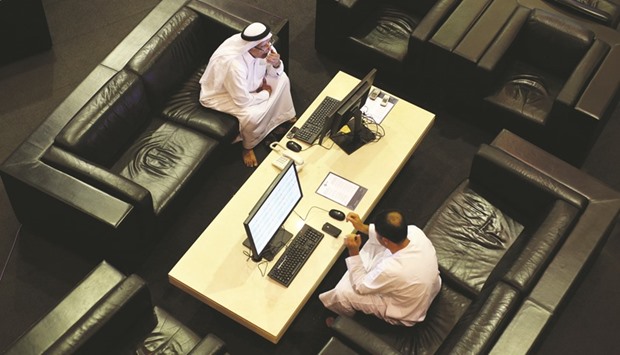Stock markets in Dubai and Egypt climbed to multi-month highs yesterday but Saudi Arabia was dragged lower by banking shares vulnerable to economic pressures due to low oil prices.
Dubai’s index rose 1.0% to end at 3,602 points, just below technical resistance at its April peak of 3,605 points, as trading volume more than doubled from Sunday, a positive technical signal.
Any break of resistance would point up to the October peak of 3,740 points.
Emaar Properties added 1.4% to Dh7.44, taking its gains over the last week to 7.8%.
The stock confirmed a break of resistance on the October peak of Dh7.01, triggering a major reverse head & shoulders pattern formed by the highs and lows since August 2015 and pointing up in the very long term to around Dh9.75.
The Gulf’s only listed exchange, Dubai Financial Market, gained 3.8% in its heaviest trade since May 3.
But builder Drake & Scull, the most heavily traded stock, dropped 3.7% after reporting a second-quarter net loss attributable to owners of the parent of Dh207.6mn ($56.6mn), versus a profit of Dh10.3mn a year earlier.
EFG Hermes had forecast a quarterly loss of Dh11.4mn.
In Abu Dhabi, the index climbed 0.7% with main support from large-cap bank shares.
National Bank of Abu Dhabi and Union National Bank each added 1.2%.
Cairo’s main index rose 1.2% to a 14-month closing high of 8,454 points.
Arabian Cement jumped 4.1% in unusually heavy trade.
The stock is owned to a large degree by international funds including Morgan Stanley Investment Management and Ashburton.
Commercial International Bank, another stock favoured by foreign investors, rose 3.2%, taking its gains over the last week to 5.2%.
The market’s index has advanced 2.0% since Egypt announced on Thursday that it had reached preliminary agreement on a three-year, $12bn loan from the International Monetary Fund.
GB Auto, which rose 1.6% on Sunday after posting strong second-quarter earnings, dropped 2.4% yesterday.
In Saudi Arabia, the index failed to hold onto early gains and closed 0.3% lower as banking shares weighed on the bourse; heavyweight National Commercial Bank fell 0.5%.
Some analysts are concerned about the financial difficulties of major construction firm Saudi Oger, which could pressure suppliers around the sector and the banks which lend to them; financial website Maaal quoted unnamed economists as saying 300bn riyals ($80bn) of debt could be vulnerable.
Investors are also concerned by the pressures on liquidity at banks due to low oil prices.
After King Salman on Sunday ordered a month’s extra pay for Saudi military and security personnel actively involved in military operations in Yemen, the central bank issued a statement yesterday saying this would not compromise the banking system in any way.
But the petrochemical sector was resilient after this week’s rise in oil prices, with the sub-index adding 0.2% as Brent oil futures traded over $47 a barrel.
Elsewhere in the Gulf, the Kuwait index edged down 0.1% to 5,492 points, the Oman index edged down 0.1% to 5,907 points and the Bahrain index added 0.1% to 1,159 points.

Visitors look at financial information on computer screens at the Dubai Financial Market. DFM, the Gulf’s only listed exchange, gained 3.8% yesterday in its heaviest trade since May 3.
